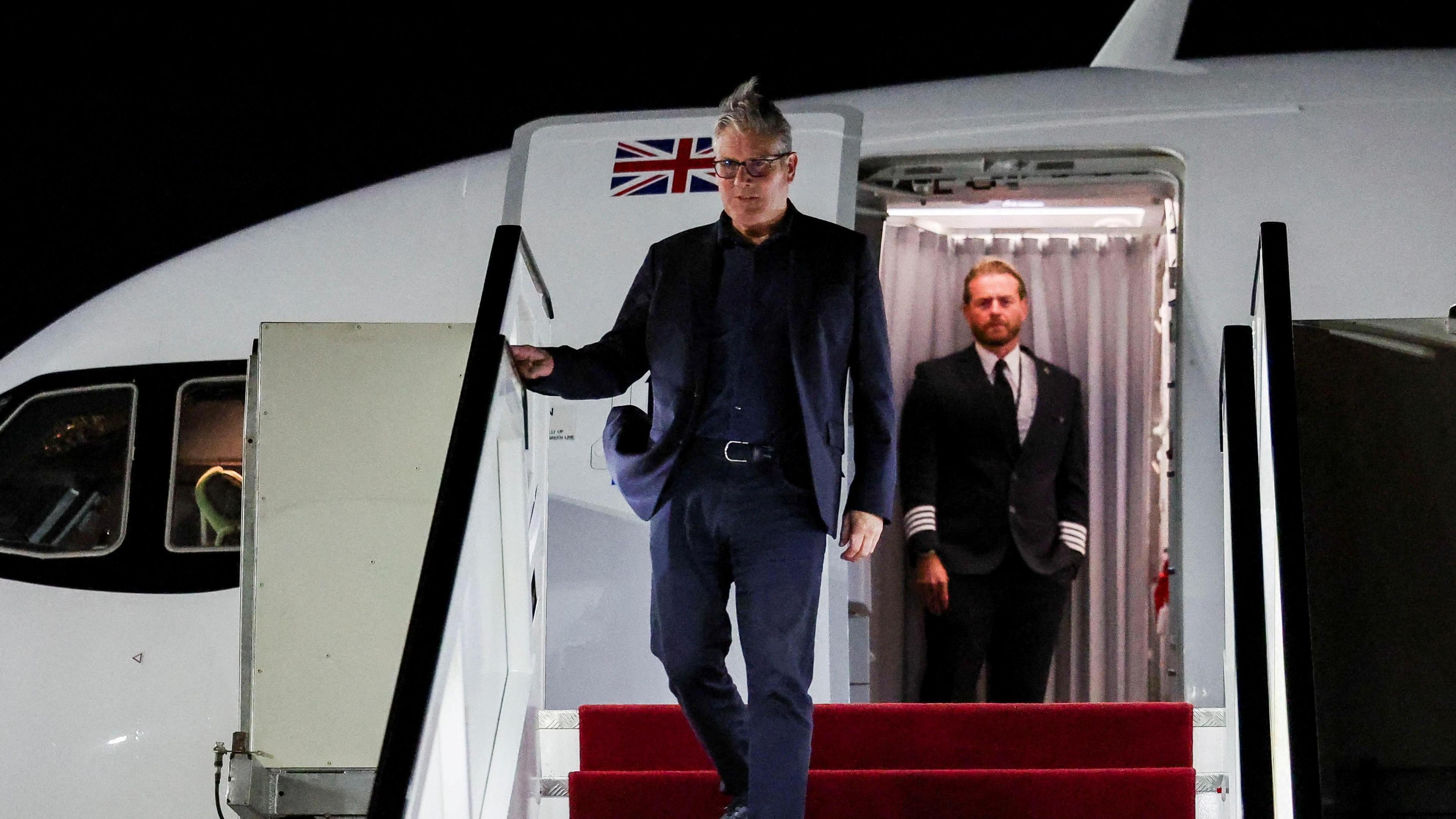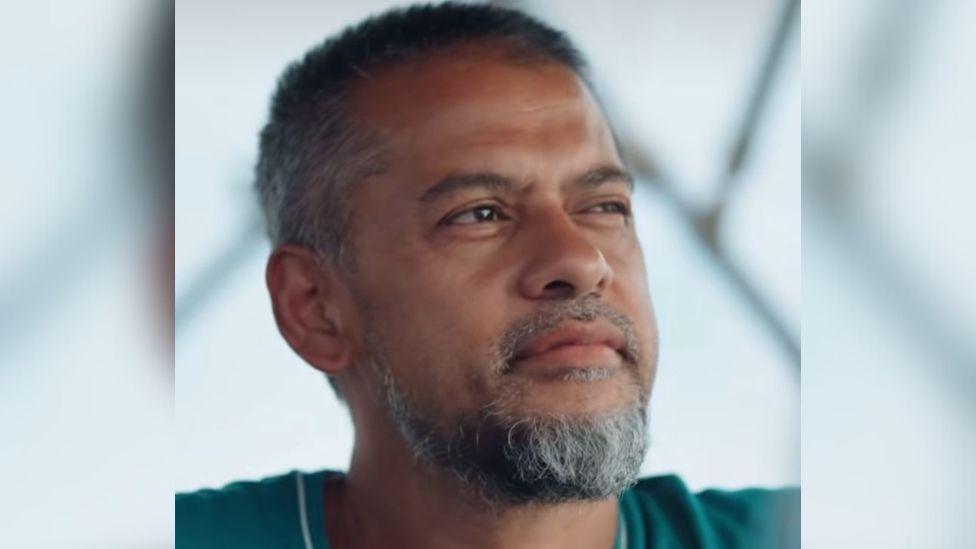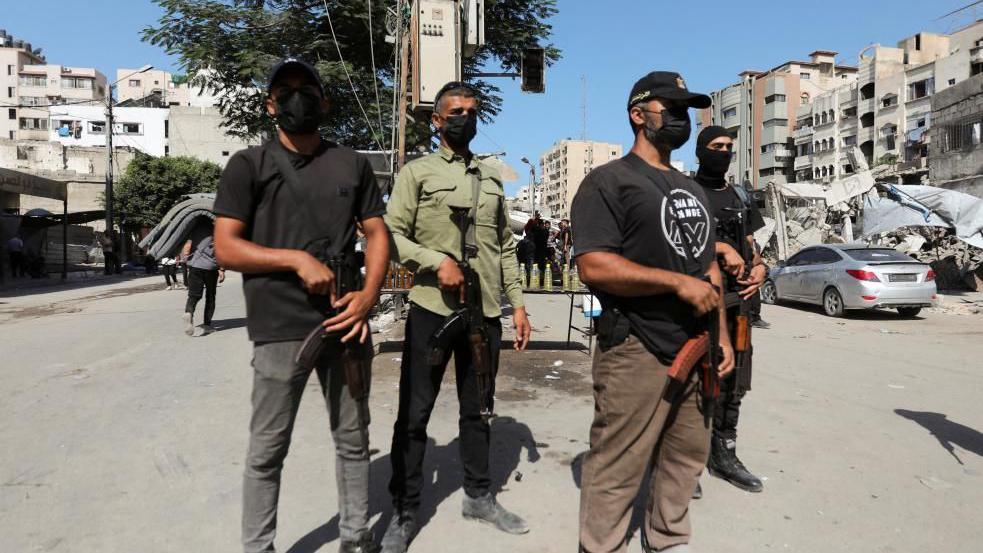Starmer arrives in Egypt ahead of summit on Gaza plan

The prime minister landed at Sharm el-Sheikh International Airport late on Sunday
- Published
The prime minister has arrived in Egypt ahead of an international summit where a peace plan for Gaza is due to be signed.
Sir Keir Starmer will pay "particular tribute" to US President Donald Trump at the gathering in Sharm el-Sheikh, Downing Street has said.
A ceasefire in Gaza took effect on Friday morning after Israel and Hamas agreed to the first phase of a ceasefire and hostage return deal brokered by Trump, with latter phases still to be negotiated.
The US president will lead Monday's summit alongside Egypt's President Abdel Fattah al-Sisi, with leaders from more than 20 countries in attendance, a spokesman for Sisi said.
Under the deal, Hamas has until 12:00 (09:00 GMT) on Monday to release all Israeli hostages - including 20 who are believed to be alive, and the remains of up to 28 deceased hostages.
Israel should also release around 250 Palestinian prisoners and 1,700 detainees from Gaza, while increased amounts of aid should enter the Strip.
Many details for the later phases, which would be negotiated after the successful completion of phase one, may prove hard to reach agreement on - such as the governance of Gaza, the extent of Israeli troop withdrawal, and the disarming of Hamas.
Palestinian president to attend Egypt summit on ending war in Gaza
- Published12 October
Ceasefire comes into force as Israel's military pulls out of parts of Gaza
- Published10 October
What we know about the Gaza ceasefire agreement
- Published14 October
Education Secretary Bridget Phillipson said on Sunday that the UK had "played a key role behind the scenes in shaping" the Gaza peace plan.
Britain had been involved in "complex matters of diplomacy", she told Sky News, without providing further detail.
Appearing later on the BBC's Sunday with Laura Kuenssberg, Phillipson was asked to spell out the UK's role, responding: "We do have a role, but of course the role of the US has been critical in this - we can all recognise that."
However, Mike Huckabee, the US ambassador to Israel, called Phillipson's comments "delusional". He wrote on X: "She can thank [Trump] anytime just to set the record straight."
Israel's deputy foreign minister Sharren Haskel further criticised the UK's claims on Sunday.
Asked whether the UK had played a key role, she told Sky News the "opposite" was true.
Haskel said decisions by the UK government - including to recognise Palestinian statehood last month - had "actually pushed Hamas to embolden their position".
But on Monday, Trump's Middle East envoy Steven Witkoff wrote on social media: "I would like to acknowledge the vital role of the United Kingdom in assisting and co-ordinating efforts that have led us to this historic day in Israel.
"In particular, I want to recognize the incredible input and tireless efforts of National Security Advisor Jonathan Powell."
Monday's summit in Egypt will mark "a historic turning point for the region after two years of conflict and bloodshed", Downing Street said.
Sir Keir will thank Egypt, Qatar and Turkey, as well as Trump, for "bringing us to this point", before calling for continued co-ordination to secure "swift progress towards phase two" of the truce.
No 10 added in its statement: "He will offer the UK's steadfast support and engagement with international partners as we look to secure the ceasefire, get urgently needed humanitarian assistance into Gaza and secure a basis for a lasting peace and security."
French President Emmanuel Macron will also attend, the Elysee Palace confirmed on Saturday, and will "express his full support for the implementation of the agreement".
A spokesperson for Egypt's presidency said the summing - which was confirmed late on Saturday - was intended to "end the war in the Gaza Strip, strengthen peace and stability efforts in the Middle East, and open a new page in regional security and stability".
Trump had told reporters at the White House on Friday that he would be travelling to the region on Monday, addressing Israel's parliament the Knesset, before heading to Egypt.
He said: "We have a lot of leaders from all over the world coming too, they've been invited."
Shadow foreign secretary Dame Priti Patel said the prime minister's visit to Egypt would be a "photo opportunity" and that the government had "no role whatsoever" in the Gaza ceasefire.
"I think it's extraordinary that Keir Starmer is apparently going to Egypt tomorrow when we've got plenty of domestic issues that he should be resolving," she told Kuenssberg.
The ceasefire came into effect after the Israeli government approved the first phase of Trump's ceasefire and hostage return deal on Thursday, following three days of indirect talks in Egypt.
The Israeli military said it had partially withdrawn troops from parts of Gaza and pulled back to an agreed position within the territory - though troops still occupy half of the Strip.
The UK has already said it has "no plans" to send British troops to be part of a multinational force that will monitor the latest ceasefire from Israel.
The US is moving up to 200 troops already based in the region to what it is calling a civil-military co-ordination centre in Israel, officials have said, alongside forces from Arab and Muslim countries including Egypt, Qatar and Turkey.
Downing Street said that the UK will also host a three-day summit from Monday to discuss Gaza's recovery and reconstruction.
Attendees will include representatives from Saudi Arabia, Jordan, Germany and the Palestinian Authority.
Foreign Secretary Yvette Cooper said on Friday that the UK would continue to support the peace process in other ways, including looking at getting private finance into Gaza.
Israel's war on Gaza was triggered by the Hamas-led attacks on southern Israel on 7 October 2023, in which about 1,200 people were killed and 251 taken hostage.
Since then, more than 67,000 Palestinians have been killed, including more than 18,000 children, the Hamas-run health ministry says.
A previous ceasefire agreement that began in January collapsed after two months when Israel resumed its military offensive, having never got past the first stage of a three-stage plan.
Related topics
- Published12 October

- Published11 October
